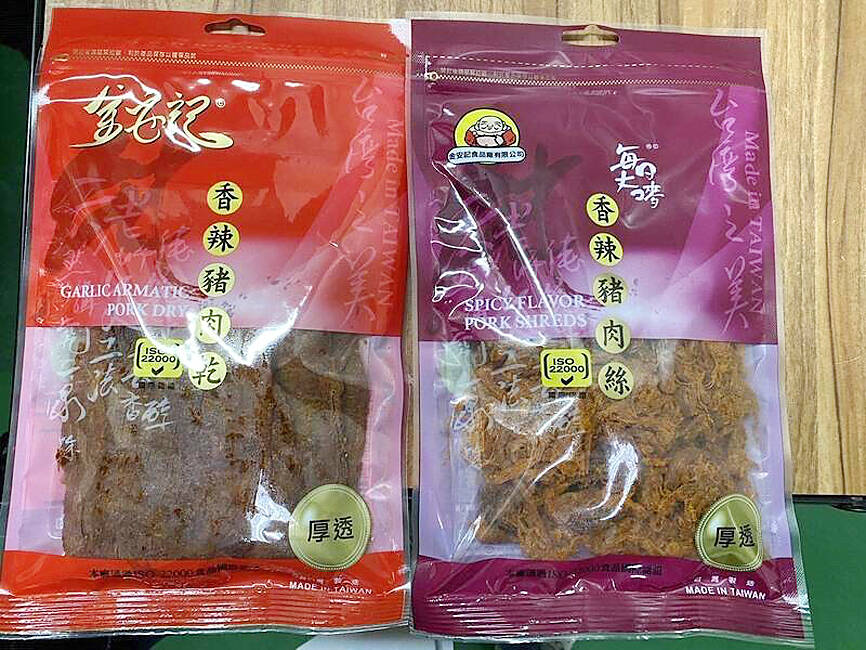A banned industrial dye has been detected in three more batches of chili powder imported from China, the Food and Drug Administration (FDA) said yesterday, adding that affected products had been removed from store shelves as of Friday afternoon.
Earlier this week, food products were found to contain chili powder with the carcinogenic Sudan III dye, imported by Bao Hsin Enterprises Co Ltd (保欣企業) in New Taipei City from Sanhe Drug Co Ltd (三禾藥業) in China’s Henan Province, leading to random inspections that have so far uncovered three more batches containing the dye, the FDA said.
The batches include one inspected by the New Taipei City Department of Health, with an expiration date of Oct. 4, 2026, and two inspected by the Taoyuan Department of Public Health, with expiration dates of Oct. 29, 2026, and Jan. 7, 2027, it said, adding that they were supplied to 10 companies.

Photo courtesy of the Taichung Office of Food and Drug Safety
As of 5pm on Friday, 3,528.3kg of the tainted chili powder and food products containing it had been recalled or removed from store shelves, the agency said.
The Taichung Office of Food and Drug Safety yesterday said that its expanded inspections have found that food company Jinanji (金安記) purchased chili powder from another Bao Hsin batch, with an expiration date of Oct. 12.
Resampling and retesting on Friday confirmed that the chili power contained Sudan III, at concentration level of 20 parts per billion, it said.
Jinanji purchased 325kg of chili powder and used 73kg of it on its “Garlic Armatic Pork Dry” (香辣豬肉乾) product, with expiration dates between Aug. 10 and Feb. 6 next year, and “Spicy Flavor Pork Shreds” (香辣豬肉絲) products, with expiration dates between Aug. 9 and Feb. 5 next year, it said.
The two products weigh a total of 6,739kg and were sold to 15 areas in Taiwan, it said.
Jinanji has informed its 42 downstream clients to recall the food products containing the tainted chili powder, and the unused chili powder has been returned to its supplier in New Taipei City, the office said.
Regarding the differences between the FDA and the Taichung office’s recall numbers, FDA Deputy Director-General Lin Chin-fu (林金富) said that inspections in the consumer market are conducted by local governments, which report back to the FDA, so there is often a one or two-day gap before the agency can include local data.
The FDA has since Dec. 11 last year conducted batch-by-batch border inspections on chili powder imported from China, which are to continue until June 10. It on Wednesday announced that 21 importers or manufacturers that have used the tainted chili power would be suspended from importing chili pepper powder from China for three months.
Additional reporting by CNA

SECURITY: As China is ‘reshaping’ Hong Kong’s population, Taiwan must raise the eligibility threshold for applications from Hong Kongers, Chiu Chui-cheng said When Hong Kong and Macau citizens apply for residency in Taiwan, it would be under a new category that includes a “national security observation period,” Mainland Affairs Council (MAC) Minister Chiu Chui-cheng (邱垂正) said yesterday. President William Lai (賴清德) on March 13 announced 17 strategies to counter China’s aggression toward Taiwan, including incorporating national security considerations into the review process for residency applications from Hong Kong and Macau citizens. The situation in Hong Kong is constantly changing, Chiu said to media yesterday on the sidelines of the Taipei Technology Run hosted by the Taipei Neihu Technology Park Development Association. With

CARROT AND STICK: While unrelenting in its military threats, China attracted nearly 40,000 Taiwanese to over 400 business events last year Nearly 40,000 Taiwanese last year joined industry events in China, such as conferences and trade fairs, supported by the Chinese government, a study showed yesterday, as Beijing ramps up a charm offensive toward Taipei alongside military pressure. China has long taken a carrot-and-stick approach to Taiwan, threatening it with the prospect of military action while reaching out to those it believes are amenable to Beijing’s point of view. Taiwanese security officials are wary of what they see as Beijing’s influence campaigns to sway public opinion after Taipei and Beijing gradually resumed travel links halted by the COVID-19 pandemic, but the scale of

A US Marine Corps regiment equipped with Naval Strike Missiles (NSM) is set to participate in the upcoming Balikatan 25 exercise in the Luzon Strait, marking the system’s first-ever deployment in the Philippines. US and Philippine officials have separately confirmed that the Navy Marine Expeditionary Ship Interdiction System (NMESIS) — the mobile launch platform for the Naval Strike Missile — would take part in the joint exercise. The missiles are being deployed to “a strategic first island chain chokepoint” in the waters between Taiwan proper and the Philippines, US-based Naval News reported. “The Luzon Strait and Bashi Channel represent a critical access

Pope Francis is be laid to rest on Saturday after lying in state for three days in St Peter’s Basilica, where the faithful are expected to flock to pay their respects to history’s first Latin American pontiff. The cardinals met yesterday in the Vatican’s synod hall to chart the next steps before a conclave begins to choose Francis’ successor, as condolences poured in from around the world. According to current norms, the conclave must begin between May 5 and 10. The cardinals set the funeral for Saturday at 10am in St Peter’s Square, to be celebrated by the dean of the College